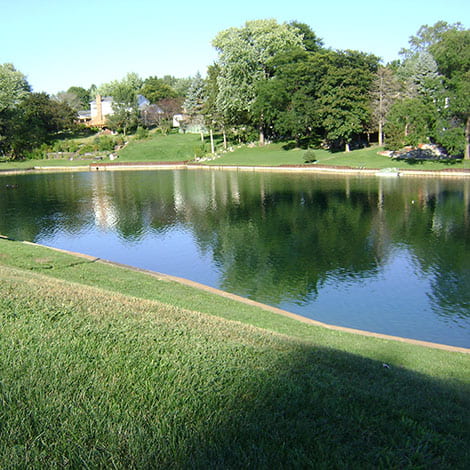Asked By: James of Augusta, GA
A: Lawn fertilizers can do beautiful things to your terrestrial landscape. They infuse the soil with nitrogen, phosphorous and potassium. They make the grass green and lush. They're sometimes mixed with pesticides and selective herbicides, creating a bug and weed-free lawn. When used as directed, fertilizers give you an easy way to feed your meadows.
They do, however, have their down side – particularly if they find their way into your pond or lake.
The phosphorous found in lawn fertilizers can help feed algae growth in your pond. That algae growth, when left unchecked, can create pea-soup colored water, deplete its life-sustaining oxygen and harm your fish. That's not all. Some lawn fertilizers contain other chemicals that may not be friendly to humans and your aquatic environment.
So how can you limit or prevent fertilizers from entering your pond?
- Divert storm water away from your pond: Some runoff will inevitably flow into your pond but, if possible, fashion trenches and canals that steer that storm water into the sewer system or an unused field.
- Find a fertilizer with low or no phosphorous: Fertilizer labels include three numbers that refer to their nitrogen (N), phosphorous (P) and potassium (K) levels. In a 5-3-4 fertilizer analysis, for instance, the "3" represents the amount of phosphorous; the higher the number, the more phosphorous in the mix. When shopping for a lawn fertilizer, choose one with the least amount of phosphorous.
- When fertilizing, stay at least 25 feet away from the pond's edge: This will create a fertilizer-free barrier around your pond, thereby preventing the chemicals from leeching into the water.
- Use natural products that help cleanse organics from pond water: If algae blooms do happen in your pond, use natural products that contain nutrient-eating beneficial bacteria. The microorganisms found in products like Airmax PondClear will break down the suspended debris and muck, while Airmax EcoBoost PRx Phosphate Control and Bacteria Enhancer binds and eliminates phosphates and other toxins.
If the chemicals found in lawn fertilizers concern you, consider using a more natural approach. You can keep your lawn lush and green with grass clippings, aged compost and organic fertilizers. Treat weeds with vinegar/water/soap mixture or corn gluten. Think "green" when feeding your lawn – your pond and its residents will thank you for it!

